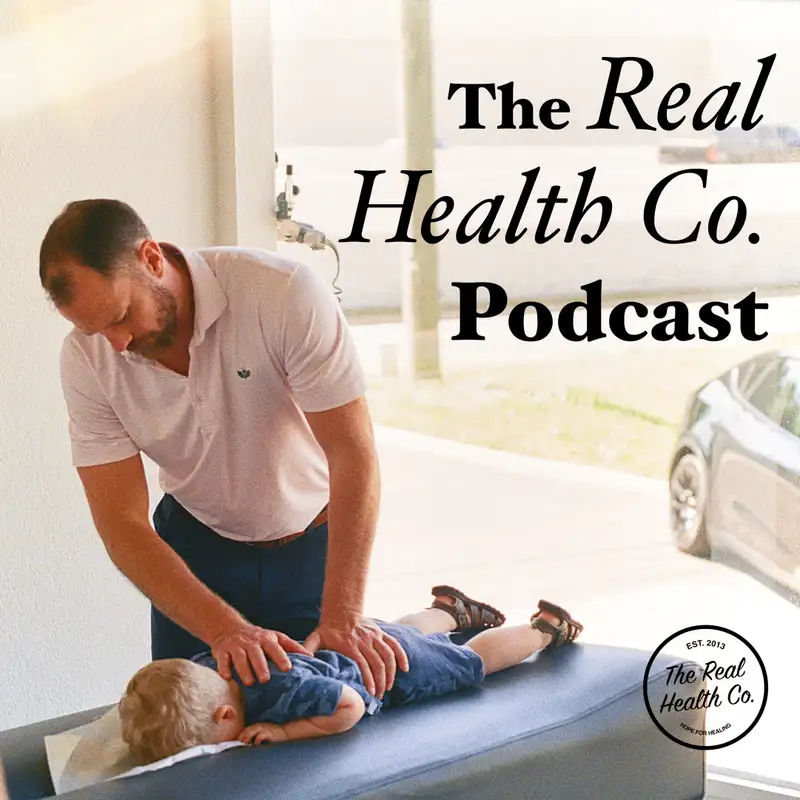 Episode 129
Episode 129
· 10:34
Welcome back to another episode of the Real Health Podcast. We're talking about how fasting increases life expectancy today. Last week, we talked about how sauna increases life expectancy. Today, it's how does fasting increase life expectancy. And in ten minutes, I'm gonna deliver as much content as I can to help you understand why fasting should be a regular part of your daily practice, weekly practice, yearly practice.
Dr. Barrett:So let's dive in. Why fasting? Because in essence, humans, we're evolved. We are evolved as creatures of adaptation to fasting. We're evolved with periods of not only feast, but also famine.
Dr. Barrett:And our bodies literally have genes. We are genetically engineered designed by God to thrive without constant food intake. Fasting is not starving yourself. Fasting is controlled metabolic rest. There's a definition there I really want you to own and communicate to those around you.
Dr. Barrett:Fasting is not starvation. It's controlled metabolic rest. It's giving your metabolism rest. Look at the data. It shows that if you continually eat, you're going to live shorter lives.
Dr. Barrett:Fasting extends life expectancy. Let's look at the research. A lot of the research comes from Dr. Longo from USC and he showed through mice studies that periodic fasting allowed mice to live anywhere between 11 to 30% longer. There was research that showed alternate day fasting, so eat one day, fast another, eat next, fast the next, showed that rodents increased life expectancy 20 to 50%, which is just staggering.
Dr. Barrett:And there's been some human studies that show a 25% caloric restriction improved markers of aging. And in 2019, the NEJM, N-E-J-M, so the New England Journal of Medicine review, said intermittent fasting reduces risk of obesity, diabetes, cancer, and cardiovascular disease. So we know it helps with aging. We know it helps with disease formation in the body. Let's talk about what is actually happening.
Dr. Barrett:So why does fasting actually increase life expectancy? What's actually happening? One of the biggest things it does at about sixteen hours in without food is it kicks into something called autophagy, which is your immune system's ability to eat and digest and remove damaged proteins from the body. Now this happens particularly- turns on around sixteen hours, but really starts to take shape around twenty four to forty eight hours, and autophagy is one of the greatest benefits to extended fasting, is we get this cellular cleanup. It's this gene that your body turns on and autophagy sets into place, which is that immune system just healing and allowing your body to recover from the damage that's been done.
Dr. Barrett:It also fasting improves metabolic flexibility, so your ability to go without carbohydrates and use fat and ketones as primary source of fuel, which then in turn helps with hormone sensitivity, in particular insulin sensitivity, and virtually everyone on a Western diet needs improved insulin sensitivity. So this is massive. One of the things it does is it reduces something called IGF-one and another marker of aging we call mTOR. IGF-one and mTOR are two markers of aging that are specific to fasting and its ability to reduce both of those markers in the body when you are fasting and when you practice regular fasting. There's been some cool studies on how it improves brain derived neurotrophic factors.
Dr. Barrett:We call that BDNF in the brain and how it supports neurogenesis, formation of nerve cells. So this idea that your brain can heal from damage that's been done absolutely is true, and fasting is one of the greatest tools in getting into a key state of ketosis. It's one of the greatest tools you can use to heal the brain. So what are some other health conditions? Well, type two diabetes, obesity, cardiovascular disease, neurodegenerative diseases, cancer have all shown to improve under fasting guidelines or reduce the risk of those particular chronic diseases.
Dr. Barrett:And there's two really types of fasting. There's true fasting, which is going without food for an extended period of time. And then there's something what we would call is just like intermittent fasting. And intermittent fasting is where you specifically will remove food for a window of time. And that window of time may be anywhere between, twelve hours at the minimum as much as fourteen to sixteen hours.
Dr. Barrett:Most people will practice a sixteen:eight, which means they're fasting for sixteen hours and feeding for eight hours, okay? So even intermittent just fasting has been shown to improve metabolism and to initiate autophagy. When we look at prolonged fast, so over sixteen hours to twenty four to seventy two hours, we start getting into deeper autophagy. We get an immune system reset. We it improves your circadian rhythm, melatonin production, cortisol production, and that's really where healing starts to happen.
Dr. Barrett:But there are studies that show that just intermittent fasting, getting to that sixteen hour mark alone helps drive growth hormone production, helps drive testosterone production, helps drive healing, and more importantly, it helps create a sensitive metabolic system, which anyone again can benefit from. Here's some myths. So when you think about fasting, here's some myths I'm gonna give to you. "If I fast, will I lose muscle?" No.
Dr. Barrett:You do not lose muscle by fasting. You actually go into a massive surge of muscle growth post fast due to a hormonal reset. Particularly growth hormone increases significantly to preserve muscle fiber breakdown. Now you're gonna lose weight. That weight is gonna come mainly from water and glucose.
Dr. Barrett:As your sugar levels drop, your glucose level levels drop, you will lose weight. So, yes, you sit on the stool. You're gonna lose five pounds of water weight, of some fat, whatever, but it is not muscle. "Does fasting slow your metabolism?" No.
Dr. Barrett:Starvation does, but not fasting. What if does it doesn't it cause, like, really low energy? It actually improves mental clarity. Most people when they fast and get into that state of ketosis, see this just dramatic increase in mental clarity and focus. And what about, "hey, this isn't safe for women."
Dr. Barrett:"Heard fasting is not safe for women." Fasting is designed, the same genes in a male are the same genes in a female. We are all designed to fast. I wouldn't necessarily like, I wouldn't approve a woman to fast if she's pregnant or breastfeeding. There's ways to do it well, and that's why you need to really work with your medical provider so they can help you understand when the right time is to fast.
Dr. Barrett:So what do we do? Right? How do we start? So here's my typical recommendation, you go listen to some previous episodes of how I talk about fasting, but most of the time what we want to start with is just a twelve hour fast. Can you go twelve hours without food?
Dr. Barrett:If you do a twelve-twelve, then you can move to a sixteen-eight. So twelve hours of fasting, twelve hours of feeding. If you can do that and no snacking, snacking is terrible for your metabolism, then you're ready to progress to like a sixteen eight. Sixteen hours of fasting, eight hours of feeding. If you do a sixteen eight consistently for a few days, then you can try a twenty four hour fast.
Dr. Barrett:No problem. Then you can even work up to a seventy two hour fast. If you want a supportive guide, we actually have a fasting guide on our website. Go to realhealthco.com under the resources tab. You'll see a fourteen day blueprint on how to fast.
Dr. Barrett:The key takeaways when it comes to fasting is it increases longevity. It activates healing. It reduces chronic disease. What you need to do is figure out how to start incorporating it into your daily, monthly, and yearly routine. Start small, build up from there, but everyone needs to work with a medical provider and start incorporating fasting as a regular lifestyle tool.
Dr. Barrett:This is- this could potentially reduce so much chronic disease and increase life expectancy, and it's free. It doesn't it actually you save money fasting because you're not eating. Alright? Give me something that you actually earn money and you increase life expectancy doing it. And everything else you're spending tons of money on.
Dr. Barrett:Why would you not do something as simple as what God designed your body to do? So let's get fasting. Thanks for listening to another episode of the Real Health Podcast.
Dr. Barrett:Our passion is to add value to your healthcare journey. Anything that we do, we want to do it within a community to help as many people as possible. Thanks for listening to episodes of the Real Health Podcast. If you could like, if you could subscribe, and you can share, it would help our mission to reach as many people with real health that produces real results for real people.

Listen to The Real Health Co. Podcast using one of many popular podcasting apps or directories.